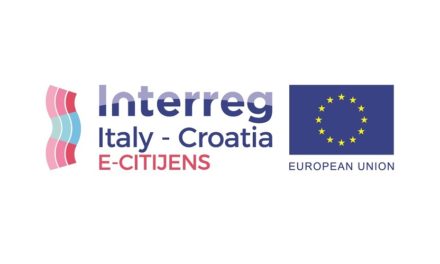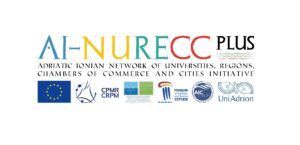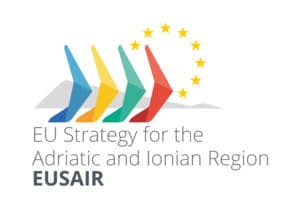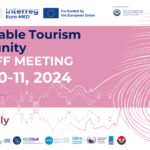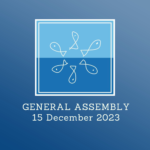
The Adriatic Ionian Euroregion (AIE), in collaboration with AIE’s member the Regional Council of Tirana, organised the first “Adriatic Ionian Youth Organisations Forum” (AIYOF) in Tirana on 19 November 2019. The event felt under the AI-NURECC Initiative Youth Action and was kindly hosted by the Europe House, the spaces of the EU Delegation to Albania, at its brand new premises.


Tirana, vibrantly acclaimed European Youth Capital 2022, was chosen to host the AIYOF to stimulate Adriatic Ionian youth organisations in learning about the EU Strategy for the Adriatic Ionian Region (EUSAIR), a platform of cooperation among EU Member States and accession countries, as well as about the linked funding opportunities. With the AIYOF, the AINURECC Initiative has provided youth organisations an occasion to network and exchange views, while participating to the creation of an open dialogue with EU and EUSAIR policy-makers. Youth organisations were asked to pinpoint common challenges and ways to improve existing strategies by including inputs from the youths. The youth organisations involved in the event represented Albania, Bosnia and Herzegovina, Greece, Italy, Montenegro and Serbia.
The event was attended by almost 100 people among which mostly university and high school students, school managers and university professors, VET organisations, NGOs, chambers of commerce as well as representatives of national, regional and local authorities. In order to enhance its impact at local and European level, the event was broadcasted by national TV channels such as Top Channels, Ora new, Rtsh, Vizion plus, Tv Klan and promoted online through AIE’s social networks, mainly facebook as well as twitter, which alone totalled more than 5.250 views in one day.
The event was officially opened by the Chair of the Regional Council of Tirana and Deputy-Chair of the Adriatic Ionian Euroregion, Mr Aldrin Dalipi, the Albanian Minister of Tourism and Environment, Mr Blendi Klosi, and the Mayor of Tirana, Mr Erion Veliaj, who highlighted how youth need to be involved as major beneficiaries of a Balkan space and of development strategies targeting sustainable tourism, green technologies, digital transformation, growth and modernisation of enterprises. In the following technical session, Ms Joanna Mouliou-Niessler from DG REGIO explained the European Commission’s policy objectives for the forthcoming programming period (2021/2027), of which youth represents an integral part. Youth initiatives will need to be supported under both Interreg and direct funding programmes stemming from the new regulations, that is why Ms Mouliou suggested to search for and take inspiration from the good practices emerged from the previous and current programming period (such as those carried out under the Interreg Atlantic area programme, the Danube Transnational programme, the Baltic Sea Region programme, the Interreg Central Europe or direct funding programmes such as Cosme, Horizon 2020, Creative Europe), as well as to liaise with macro-regional implementers and propose a voluntary action. Mr Armand Skapi, Secretary General of the Albanian Ministry for Europe and Foreign Affairs highlighted how youth involvement in the EUSAIR platform and a greater awareness of the opportunities linked to it may counteract the brain drain from the Western Balkans to Northern Europe. The increase of skills and knowledge of young people and youth organisations with regard to the untapped opportunities available through EU, national and regional funding programmes is a viable strategy for the capitalisation of both the EUSAIR and existing project ideas and best practices.
The third session focused on youth cooperation as implemented by Adriatic Ionian Youth Organisations, universities and other public administrations. The session was moderated by Mr Bernard Dosti, Deputy-Rector of the University of Tirana. Mr Polignano, from the Delegation to Tirana of the Apulia Region (Italy), explained how the forthcoming Interreg Italy-Albania-Montenegro programme is being developed based on the five EU policy objectives (smarter Europe, greener and carbon free EU, more connected Europe, more social Europe, a Europe closer to citizens), with the goal of promoting employment, entrepreneurship and social development of youths. Mayor Caporicci presented the Arbëreshë community of Portocannone in Italy and the initiatives that have been carrying out to safeguard the Arbëreshë cultural, ethnic and linguistic heritage also though cooperation with other communities in Italy and with Albania. Mr Genci Kojdheli, General Director for Strategic Projects & Foreign Investments of the Tirana Municipality, illustrated the Active Youth project through which Tirana won the European Youth Capital 2022 competition, explaining how the youths were involved in creating the proposal (e.g. the National Youth Congress, Novi Sad EYC 2019, Thessaloniki 2014). Two Albanian universities took part in the session: the University “Luarasi” in Tirana and the University “Aleksander Moisiu” in Durres.
Four Adriatic Ionian Youth Organisations presented their activities and priorities: the Bosnian Representative Association for Valuable Opportunities (BRAVO), the Western Balkans Alumni Association (WBAA), the Students’ Academic Senate of the University of Tirana, the Youth Centre of Epirus, an NGO also managing the local Europe Direct Office. These organisations represented different kinds of associations, with specific internal organisation and operative tools, all engaged in many activities including mainly volunteerism, European project design and management, intra-regional cooperation. Youth Organisations and attendees were also exposed to two AI-NURECC Initiative youth-related actions: the EUSAIR Youth Games organised by the Forum of Adriatic and Ionian Cities (FAIC) and the Adriatic Start-up School organised by the Forum of Adriatic Ionian Chambers of Commerce (Forum AIC).
The last session of the Forum was devoted to identifying recommendations for a better involvement of youth in policy-making. Representatives of overarching platforms such as the Young European Federalists (YEF), the Regional Youth Cooperation Office (RYCO), Forum Mladi I Neformalna Edukacija (Forum MNE), Cooperation and Development Institute (CDI), “Junior Achievement of Albania” and Code Partners contributed to the session. A common denominator was found among the several presentations on how to involve youth in policy-making and make them more aware of the benefit of transnational cooperation and macro-regional approaches. Speakers called Adriatic Ionian policy-makers to:
- Improve the participation of young people, vulnerable people, young civil servants and young professionals in international exchanges e.g. through the creation of an Erasmus programme for the Western Balkans
- Provide opportunities to increase youth knowledge of the EUSAIR and the EU e.g. through an education programme focused on leadership and policy-making at macro-regional level
- Promote self-employability of youth by means of entrepreneurship development strategies especially in the fields were youngsters are skilful such as ICT, creativity and social inclusion
- Stimulate Adriatic Ionian youth organisations, including student associations and NGOs, to establish a transnational platform based on ad hoc “memoranda of understanding” aimed at achieving a critical mass to establish an open dialogue with the structures and actors of the EUSAIR;
- Stimulate stakeholders to seek an open a dialogue with colleagues of other Macroregional Strategies (EUSBSR, EUSALP, EUSDR) as to exchange good practices and promote a stronger youth cooperation.
The recommendations were included in a study about youth participation in the Adriatic Ionian area.
Download the study here: Enhancing youth participation for a more and innovative and integrated Adriatic Ionian Euroregion
Download the presentations here





